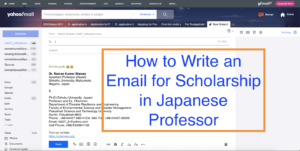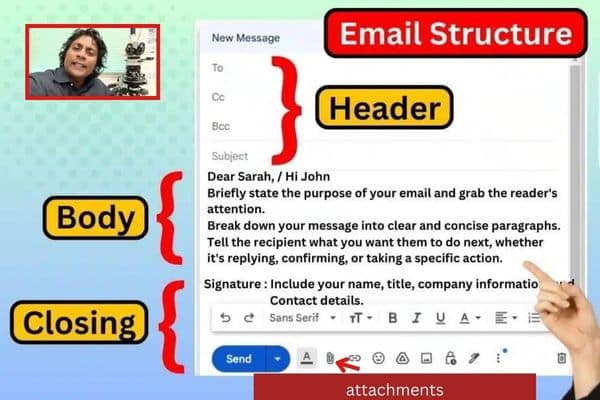How to Email to Manager or a Professor for Scholarship in Japan
Recently I discovered How to Email to Manager. Lets talk about How to Email to Manager or to your boss. When first time I wrote to a manager in my life I did so many mistakes. The mistakes are not to add the subjuct line or not to write the body of the email properly. I wanted to write the best way but due to the lack of my knowledge I failed. Now I know how to email to manager. Lets dive into it.
I have seen many university teacher also can not write how to email to manager or their professor. Specially when I have seen some university colleague send me email I am so surprise to see their email and way of writings. Most of the time we ignore the email due to the lack of the subject line of the email.
Never do that. Lets do hwo to how to write a best and effective emial to your boss or your seniors.
Most of the time we face a problem on How to Email to Manager or to the professor to get hired or get a scholarship. If you are new to this topic then I will show you step by step how to write an email to your professor to get the supervisor’s consent to apply for the scholarship. In Japan you have to get the supervisor’s approval in the very beginning then you can follow his instructions to get the scholarship.
Once, you get the supervisor’s consent then you don’t need to apply separately for the scholarship for a higher study like a Master’s or Ph.D. in Japan. The supervisor will instruct you all on the next step.
So, Getting the Professor’s consent is very very important for getting the scholarship, especially in Japan. So, follow these steps as I discussed below for how to write an email to the professor and what will be the appropriate Parts of an Email of how to write an email to your professor to get consent for the agreement for the scholarship abroad.
Most of the time we face problems with how to write an email to a professor especially those who are very new for searching scholarships. Here I will show you step by step all the parts of an email to write to the professor.
Before writing a good email we have to know the accurate format of an email.
Proper email format when emailing a manager

1st Step: Greetings;
In this part, you have to greet your professor with “I hope this mail finds you well” and then you have to introduce yourself in a kind manner. The greeting depends on the recipient and the status of the professor or the rank of the recipient of the email.
2nd Step: Introduction:
The 2nd step is the introduce yourself. Write all the necessary information uptodate so far you have. Never use your old status or position which you are not. To introduce yourself you have to keep in mind that the more relevant job title suitable for your supervisor is appropriate you can use that. Use some keywords to choose the job title you have so that your skill will be visible at a glance in the very beginning to your professor.
3rd Step: Formal email body
In this step, you have to write about the main content of your interest. Here you have to make the link between you and the supervisor. Focus on the supervisor’s experience and make a link with it by your skill. If you have a skill in data analysis using Gas Chromatography and you have found your professor also uses this technology in his research then you are on the right track to continue.
Make as many links with your skill with the supervisor so that he will find you the best candidate for his work. Keep in mind that Parts of an Email in your writing to find a scholarship is the first step for achieving the goal. To get the information about the professor’s skills and expertise I suggest visiting the professor’s homepage/ research profile like Google Scholar profile. You have to find the recent research list for the recent interest of the professor.
Here might be a question where can I find the list supervisor?
Click Here to find all professor or hiring manager in Japan
65 Soft skills for the resume of a student
In step 3, always keep in mind that you have to impress your supervisor with your skills matched with the supervisor so that he can hire you. Show that you are the best student or candidate for this job position.

4th Step: The Call of Action
In this step, you have to make a request or request a suitable position for your candidacy. Directly you can ask “Would you allow me to be your lab mate to do research“? You know if you don’t ask for something no one can understand what you are looking for? So clearly you have to ask your appropriate needs to your supervisor. It might be the position in the laboratory or it might be the approval of scholarship.
5th step: How to end an email to a manager
This is the last step for your email format to write an Email to Manager or to your research boss . So far you have done everything, like greetings, introducing yourself who you are, why you have to send an email, how you link your skill to your supervisor, how you can contribute in the laboratory, and why you are important to him and the last the call of action or the asking to get hired.
Now in this 5th step, you have to close your email with a nice greeting and acknowledgement. Because you have to write to your supervisor as he reads this email and say thanks for this, Never forget to write thank you for your cooperation. It expresses that you are acknowledged to him, kind and sincere.
Email to manager subject line
This is very important to attract the recipient’s attention to click your email in the inbox. Make the title Short with keywords that might be suitable for your supervisor. Some people write the name of the supervisor in the title but to do so you should be careful not all the professors like this style, especially from the southeast region of the world.
You attract the professor to click through the email with the attractive title. People always blame like Professor does not replying to my email … So writing the appropriate title is one of the factors for this other than the proper Parts of an Email.
When I was looking for a scholarship I was requested by my university senior brother Dhiman Kumer Roy and he told me to send an email to a Japanese Professor.

I got an email reply from that professor. If you are searching for a scholarship in Japan. I recommend checking my first email how I wrote that and How I got the scholarship in Japan.
Formal Salutation: Begin with a formal greeting, such as “Dear Professor [Professor’s Last Name],” or “Dear Dr. [Professor’s Last Name].”
Introduce Yourself: Clearly state your name, course, and section number.
State Your Reason: Clearly and concisely explain the purpose of your email. Be specific and avoid unnecessary details.
Be Polite and Respectful: Maintain a formal and respectful tone throughout the email.
Proofread Carefully: Ensure there are no grammatical or spelling errors.
Appropriate Closing: End with a polite closing, such as “Sincerely,” “Respectfully,” or “Best regards,” followed by your full name.
Email to manager examples: When I have first writen to my Professor
KAIHO Kunio
Your Name
Your affiliation
How to Email to Manager for job application?
A well-crafted job application email is your first impression on a potential employer. It’s crucial to make a positive impact.
Here’s a breakdown of the key elements:
Structure of Your Email
Subject Line: Be clear and concise. Include the job title and your name. For example, “Job Application – [Job Title] – [Your Name]”
Salutation: Use a formal greeting, such as “Dear [Hiring Manager’s Name],” or “Dear [Hiring Manager’s Title].” If you don’t know the name, use “Dear Hiring Manager.”
Introduction: Briefly introduce yourself, mention the job title you’re applying for, and where you found the job posting.
Body: Highlight your relevant skills and experience that align with the job requirements. Quantify your achievements whenever possible. Briefly touch on your interest in the company and its mission.
Attachments: Clearly mention the attached documents, such as your resume and cover letter.
Call to Action: Express your enthusiasm for the position and your willingness to attend an interview.
Closing: Thank the hiring manager for their time and consideration. Include your contact information.
Appreciation for getting a job email to manager sample for
Dear [Hiring Manager’s Name],
I am writing to express my keen interest in the [Job Title] position at [Company Name], as advertised on [Job board]. With a strong background in [Your Field] and a proven track record of [Skills], I am confident in my ability to contribute significantly to your team.
[Briefly highlight your most relevant skills and experiences, and how they align with the job requirements.]
I have attached my resume and cover letter for your review, which further detail my qualifications. Thank you for considering my application. I would welcome the opportunity to discuss my candidacy further in an interview.
Sincerely,
[Your 1 Name]
[Your Email]
[Your Phone Number]
[LinkedIn Profile (optional)]
This is my story how I got the scholarship in Japan and How Write an Email to Professor for Scholarship in Japan“.
How to write an email for an internship Manager: 10 Rules
Crafting the Perfect Email for Internship: A Step-by-Step Guide
So, you’ve set your sights on that dream internship, but the first hurdle in your path is writing an email that will catch the recruiter’s attention and make them see you as the perfect fit. Fear not, because in this guide, we’ll break down the art of composing a compelling email for an internship opportunity. Whether you’re a seasoned writer or feeling a tad shaky, these tips will help you make that keyboard sing and land you a step closer to your desired internship.
1. The Prelude: Subject Line Matters
The subject line is your email’s first impression, so make it count. Keep it concise, relevant, and intriguing. An example could be: “Enthusiastic Applicant Eager to Contribute – [Your Name]”. This instantly communicates your eagerness and intention.
2. Greetings: The Power of Personalization
Dear [Recipient’s Name] goes a long way. Generic salutations won’t cut it. Addressing the recipient by name shows that you’ve done your homework and care about the opportunity. This personal touch makes you stand out from the crowd.
3. The Opener: Establishing Your Intent
Begin with a brief introduction about yourself and how you came across the internship opportunity. Remember, keep it succinct while expressing your enthusiasm for the role. For instance, “I am writing to express my sincere interest in the [Internship Position] as advertised on [Source].”
4. The Hook: Showcasing Your Research
Here’s where the magic happens. Mention something specific about the company or recent projects that resonated with you. This not only demonstrates your genuine interest but also proves that you’ve done your due diligence. For instance, “I was particularly impressed by your recent [Project Name], showcasing your commitment to innovation.”
5. Your Unique Value Proposition: Shine Bright
This is your time to shine. Highlight your skills, and experiences, and how they align with the internship’s requirements. Use keywords like “adaptability,” “problem-solving,” and “collaboration” to describe your strengths. For instance, “My experience as a [Previous Role] has honed my adaptability and collaborative skills, making me a strong fit for this internship.”
6. The Connection: Weave in Your Story
Share a brief story about a relevant challenge you’ve overcome or a project you’ve excelled in. Stories resonate and create a memorable impression. This is your chance to make an emotional connection. For instance, “During my time at [Previous Company], I spearheaded a project that required quick problem-solving, which taught me the value of remaining level-headed under pressure.”
7. Expressing Enthusiasm: The Heartfelt Drive
Convey your enthusiasm for the opportunity and the company’s mission. Use words like “inspired,” “eager,” and “passionate.” This reinforces that you’re not just looking for an internship but genuinely want to contribute to their success. For instance, “I am inspired by [Company Name]’s dedication to [Company Mission] and am eager to contribute to such a forward-thinking environment.”
8. The Call to Action: Seal the Deal
End with a strong call to action. Express your eagerness to discuss the opportunity further. This shows initiative and gives the recruiter a clear next step. For instance, “I would love the opportunity to discuss how my skills align with [Company Name]’s goals. Could we schedule a call at your convenience?”
9. Gratitude: The Final Touch
Always express gratitude for the recipient’s time and consideration. A little politeness goes a long way. For instance, “Thank you for considering my application. I appreciate your time and am looking forward to the possibility of joining [Company Name].”
10. The Farewell: Signing Off with Poise
End with a professional sign-off, such as “Best Regards” or “Sincerely,” followed by your name. Remember, your email signature should include your contact information, LinkedIn profile, and any other relevant links.
Now that you’re armed with the secrets of crafting an impactful internship application email, go ahead and draft your masterpiece. Remember, every word you choose shapes the recruiter’s perception of you. Good luck on your journey to securing that dream internship!
Here is an Example of How to write an email to Professor as a disaster manager
Professor,Takara Kaoru
DPRI, E-UE, G-EM
Disaster Management Tech. Policy,
Hydrology, Dr. Eng. (Kyoto University)
Subject: Request for Masters/PhD position.
Honorable Sir,
I, the undersigned, nationality Bangladesh have the honor to send you my up-to-date CV for exploring the possibility of securing a Master/PhD position to work in your research group at the Global COE program at Kyoto University I hope that you have an opening in your research laboratory to give me an opportunity to learn more on Disaster Management.
I have finished my B.Sc.Hons and M.Sc.degree in Geology & Mining from Rajshahi University, Bangladesh having all through 1st class results. The medium of instruction was English through my study. I was awarded the Academic Gold Medal from Rajshahi University for obtaining good results in my B.Sc in Geology and Mining. I have done a thesis on “STUDY OF GROUNDWATER QUALITY IN SHAILAKUPA UPAZILA, JHENAIDAH, BANGLADESH”.
I have done some research work on hydrogeology and disaster management which is published in national and international journals. I have gained a certificate from the University of Salford, Manchester, UK for participating, in data analysis and conducted a presentation on the Earthquake scenario in Bangladesh by INSPIRE Scheme CEREBELLA Research project funded by the British Council from 26 Feb-05 Mar. 2012. Some academic training on Disaster management and monitoring using integrated space technology(RS-GIS-GNSS-GTV&V) by Bangladesh Space Research and Remote Sensing Organization(SPARRSO). (25 Sep-05 Oct. 2011) and “9th Foundation Training for University Teachers” (12 May-10 June 2013) has enhanced my academic career which will help teachers.
At present, I am teaching in the Dept. of Disaster Resilience and Engineering, Faculty of Disaster Management, Patuakhali Science and Technology University, Bangladesh. I have taught Fundamentals of Hydrology, Credit Hour: 2, Fundamentals of Hydrology (Practical) Credit Hour: 1, Introduction to Hazard Risk and Disaster, Credit hour:2, Introduction to Earth Science Credit Hour, Indigenous Knowledge for Disaster Management, Credit hour:2, Disaster Risk Management in Business Sector, Credit Hour:2, Disaster Risk Management in Tourism Sector Credit Hours: 2, and so on. Recently, I have conducted a research project involving the Assessment of drinking water-related Arsenic and Salinity hazards in Patuakhali district, Bangladesh. I am interested in getting an opportunity to do research on Hydrological disasters and related fields in your laboratory.
I have gone through your website. Your research group is working on the Hydrological disaster and you have a vast knowledge of disaster management using remote sensing. This research topic fits with my research interests and background. I have a keen interest in working under your supervision. I believe that if I get a chance to do research under your direct supervision I will be able to acquire more deep knowledge of Hydrological disasters and related fields.
Please find attached my curriculum vitae, statements regarding my research with details of references. I appreciate being considered for a research position in your laboratory.
Please let me know if I can provide any additional information in support of my application. I look forward to hearing from you to discuss how I could contribute to your research group and its success. Thank you for reviewing my letter and my enclosed resume.
If you have an opening now or in the near future and if you find my candidature of any interest to
you, please don’t hesitate to help me. If nothing is available with you at present, then please recommend my candidature to someone who is looking for a person of my experience and qualifications.
Thanking you in anticipation.
Kind regards,
Yours sincerely
How to Email to Manager for Intership
When it comes to writing an official email for an internship, following a structured approach can make all the difference. Here’s a step-by-step guide to help you craft a professional and engaging email that leaves a lasting impression:
- Subject Line Precision: Your subject line should succinctly convey your purpose. Use a subject like “Application for [Internship Position] – [Your Name]” to clearly indicate the nature of your email.
- Formal Greeting: Address the recipient formally, using their appropriate title and last name. “Dear Mr./Ms. [Last Name]” sets the tone for professional communication.
- Introduction and Intent: Begin with a concise introduction, stating your name, the position you’re applying for, and where you found the internship listing. Make your intent clear from the outset.
- Showcase Relevant Qualifications: Highlight your relevant skills, experiences, and academic achievements that make you a suitable candidate. Use bullet points or short paragraphs for easy readability.
- Alignment with Company Values: Mention your admiration for the company’s values, mission, or recent accomplishments. Tailor your email to reflect your genuine interest in their work.
- Highlight Transferable Skills: If you’ve had similar responsibilities or experiences in the past, emphasize how those skills can be transferred to the internship role.
- Concise Experience Sharing: Briefly touch on any relevant experiences, internships, or projects that demonstrate your capabilities and enthusiasm for the internship.
- Express Enthusiasm: Let your excitement for the opportunity shine through. State how the internship aligns with your career goals and how you can contribute to the company’s success.
- Request for Further Discussion: Politely express your interest in discussing the internship further. Propose a call or meeting to delve into your qualifications and how they match the company’s needs.
- Gratitude and Closing: Conclude by expressing gratitude for the recipient’s time and consideration. Sign off with a formal closing like “Sincerely” or “Best Regards,” followed by your full name.
- Professional Signature: Include a professional email signature with your contact information, LinkedIn profile, and any other relevant links.
Remember, clarity, professionalism, and a sincere interest in the internship are key factors in writing an official email that stands out.
How to Email to Manager for intership with No Experience
Crafting an email for an internship when you lack formal experience can be a challenge, but don’t let it discourage you. Here’s a guide to help you create an email that highlights your potential and eagerness to learn:
- Subject Line with Enthusiasm: Begin with an engaging subject line like “Aspiring [Field] Enthusiast Eager to Learn – [Your Name].” This communicates your enthusiasm for the internship.
- Friendly Greeting: Start with a warm greeting using “Hello” or “Hi [Recipient’s Name].” A friendly tone sets the stage for a positive connection.
- Introduction and Purpose: Introduce yourself with a brief overview of your background and mention that you’re reaching out to express interest in an internship opportunity.
- Emphasize Transferable Traits: Focus on transferable traits and soft skills like communication, adaptability, teamwork, and a strong work ethic. These qualities are valuable even without formal experience.
- Highlight Relevant Projects: Discuss relevant projects, coursework, or extracurricular activities that showcase your skills. Explain how these experiences demonstrate your commitment to learning and growth.
- Express Curiosity: Show curiosity about the internship role and the company’s work. Mention specific projects or initiatives that pique your interest and align with your aspirations.
- Enthusiasm for Learning: Emphasize your eagerness to learn and contribute. Express your excitement about gaining hands-on experience in a real-world setting.
- Request for Consideration: Politely request that your application be considered, even in the absence of formal experience. Highlight your willingness to put in the effort to excel.
- Closing with Confidence: End your email by thanking the recipient for their time and consideration. Close with a confident sign-off like “Best Regards” followed by your full name.
- Brief Signature: Keep your email signature concise, including your name, contact information, and any relevant links like your LinkedIn profile.
Writing an email for an internship without experience is an opportunity to showcase your potential, enthusiasm, and determination to make a positive impact.
How to Write a Letter Asking for an Internship
When you’re seeking an internship, a well-crafted letter can make a persuasive case for your candidacy. Here’s a step-by-step guide on how to write a letter asking for an internship:
- Clear and Captivating Subject Line: Start with a subject line that captures attention, such as “Exploring Internship Opportunities in [Field] – [Your Name].”
- Salutation with Respect: Begin with a respectful salutation like “Dear [Recipient’s Name]” to establish a courteous tone.
- Introduction and Intent: Introduce yourself and state your purpose for writing – to express your keen interest in securing an internship in the specific field.
- State Your Value Proposition: Highlight your skills, accomplishments, and relevant experiences that make you a valuable candidate. Use precise language to showcase what you bring to the table.
- Company Connection: Demonstrate your knowledge of the company’s work and culture. Mention projects or initiatives that resonate with your career goals.
- Express Eagerness to Learn: Communicate your eagerness to learn from professionals in the field and contribute to the company’s goals. Highlight your curiosity and enthusiasm for the opportunity.
- Customize Your Pitch: Tailor your letter to reflect your understanding of the internship’s requirements and how your skills align with them.
- Connect with Past Experiences: Share how past experiences, even outside the field, have prepared you for the internship. Emphasize qualities like adaptability and problem-solving.
- Personalized Call to Action: Politely ask for the opportunity to discuss your potential contribution further, suggesting a call, meeting, or interview.
- Appreciation and Sign-Off: Conclude by expressing gratitude for the recipient’s consideration. Sign off with a professional closing like “Sincerely” followed by your full name.
- Contact Information: Include your contact details and relevant links, such as your LinkedIn profile, in a concise email signature.
Writing a persuasive letter asking for an internship requires showcasing your strengths, demonstrating alignment with the company, and conveying your sincere enthusiasm for the opportunity.
How to Email to Manager for new job application: 10 Approved Rules
1. Crafting the Perfect Email for Job Applications
When it comes to securing that dream job, the art of writing an email for a job application can be a game-changer. In today’s competitive job market, your email is your first impression, and you want it to be a lasting one. So, how do you write an email for a job application that not only stands out but also gets you noticed? Let’s dive into the nitty-gritty of composing that winning email.
2. The Power of the First Impression
Before we delve into the intricacies of writing the email, let’s address the elephant in the room: the first sentence. Your opening line sets the tone for the entire email. When the recipient reads that subject line and opening sentence, they should be intrigued, eager to read more, and ultimately compelled to consider you as a potential candidate.
3.Subject Line: Crafting Curiosity
The subject line is your ticket to capturing attention. It’s like the headline of an article; it needs to be punchy and relevant. Imagine you’re applying for a marketing position. A subject line like “Passionate Marketer Eager to Elevate Your Brand” is bound to catch the recipient’s eye. It’s concise, engaging, and it immediately conveys your enthusiasm.
4.Opening Paragraph: The Hook
Once you’ve successfully lured them in with your subject line, the opening paragraph needs to reinforce their interest. Begin by stating the position you’re applying for and where you found the job posting. A sentence like “I am writing to express my strong interest in the Digital Marketing Specialist position advertised on LinkedIn” does the job. Remember, clarity is key.
5.Showcasing Your Fit
After capturing their attention, it’s time to demonstrate why you’re the perfect fit for the role. Use the second and third paragraphs to highlight your relevant skills and experiences. Remember, this isn’t a regurgitation of your resume. Instead, share stories that showcase how your experiences have equipped you for this position.
6.Example Story: From Problem to Solution
For instance, if you’re applying for a project management role, narrate a story where you took charge of a chaotic project and turned it into a success story. Detail the challenges you faced, the strategies you implemented, and the final outcome. This not only demonstrates your abilities but also makes your email memorable.
7.Aligning with Company Values
Incorporating the company’s values and culture into your email can be a subtle yet effective way to show your alignment. Research the company’s mission, vision, and values, and find a genuine connection between those and your own beliefs. A sentence like “I am drawn to [Company Name]’s commitment to innovation, which resonates deeply with my passion for pushing boundaries in marketing” can go a long way.
8.Expressing Enthusiasm and Gratitude
Concluding your email with enthusiasm and gratitude is vital. Express your eagerness to further discuss how your skills can contribute to the company’s success. Additionally, thank them for considering your application and express your anticipation for their response.
9.Closing Paragraph: The Finishing Touch
End your email on a positive note. Use a closing sentence like “Thank you once again for considering my application. I look forward to the opportunity to speak with you further.” It’s polite, and professional, and leaves the door open for future communication.
10.Signature: Keep It Professional

Your email signature should be clean and concise. Include your full name, phone number, LinkedIn profile, and any other professional links that are relevant to the job application.
In conclusion, the art of writing an email for a job application lies in its ability to communicate your skills, experiences, and enthusiasm concisely and persuasively. Each sentence should contribute to the overall narrative, engaging the reader and leaving a lasting impression.
By employing these strategies and infusing your unique touch, you’re on your way to creating emails that not only get noticed but also open doors to exciting opportunities.
FAQ: How to write an email for job application
How to Begin a Professional Email for a Job Application
Starting off your email for a job application on the right foot is crucial. The opening sets the tone for the entire communication and can greatly impact the recipient’s impression of you as a potential candidate.
What to Include in an Email When Sending Your Resume
When attaching your resume to an email for a job application, it’s important to provide the right context and information. This section outlines what details to include in the email body to effectively introduce yourself and your qualifications.
Emailing a Manager for a Job Application: Best Practices
Reaching out to a hiring manager directly can be a strategic move in the job application process. This section offers insights into the most effective ways to email a manager, highlighting key tips to ensure your message is well-received and impactful.
This is all about How to Email to Manager.
How To Write Letter Of Qualifications: 98% Approved Strategy
100 Japan Scholarship Links: Japanese Language Course in Japan for foreigners with scholarship
